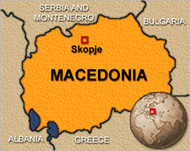Macedonia counts votes
Macedonia’s opposition claimed victory in the race for mayor of Skopje after weekend elections.

The elections are seen as a final test of a 2001 peace accord which ended an armed ethnic Albanian uprising.
The success of the polls is vital to Macedonia’s bid to join the European Union (EU) by the end of the decade.
The elections also follow the controversial re-drawing of municipal borders expected to boost local autonomy for the ethnic Albanian minority in the former Yugoslav republic.
The re-drawing is part of reforms demanded by the EU late last year.
“Skopje has a new major,” opposition spokesman Marjan Gjorcev said early on Monday as unofficial figures showed independent candidate Trifun Kostovski, a businessman supported by the opposition, in the lead.
Irregularities?
However, the ruling coalition refused to recognise the opposition victory, claiming there had been voting irregularities and calling for a second round of voting.
Social and Democratic Union party general secretary Nikola Curciev said Kostovski had received only “48.5%” of the vote while Andreij Zirnovski, spokesperson for the SDU’s coalition partner, the Liberal party, claimed there had been “major irregularities recorded” in the voting.
 |
|
Aside from some minor incidents |
The non-government organisation, MOST, had estimated on Sunday that Kostovski received 53%of the vote against 37% for outgoing coalition mayor Risto Penov.
No major incidents upset Sunday’s vote despite muted fears of ethnic unrest in light of the Macedonian majority’s overwhelming opposition to the EU-dictated electoral reforms.
“Only minor incidents were registered,” electoral commission spokesman Zoran Tanevski said late on Sunday.
Polls peaceful
Political analyst Ljubomir Kekenovski said the polls were a “great lesson for the political parties and a message to the international community”.
“They have been mainly peaceful and successful, without bad rhetoric or threats to security. We are going in a positive direction,” he said.
|
“I am glad that we all recognise that the elections have been fair and democratic” Prime Minister Vlado Buckovski |
Mainly Muslim ethnic Albanians took up arms to demand more autonomy and the protection of their human rights five years ago, threatening to make Macedonia the next Balkan country to explode in ethnic war.
But after some seven months of low-level fighting with government forces, comprised mainly of Orthodox ethnic Macedonians, an internationally-brokered peace deal was signed guaranteeing political reform.
Some 1.7 million voters were eligible to choose their representatives and mayors in 85 local councils on Sunday.
EU integration
The tightest race was expected in Skopje and in the ethnic Albanian western town of Tetovo, which was the scene of major clashes between government forces and the Albanian rebels.
“I am glad that we all recognize that the elections have been fair and democratic, which was a priority both for Macedonia and the government itself,” Prime Minister Vlado Buckovski, of the SDSM party, said.
Buckovski added that his party estimates showed that the governing coalition led by SDSM would control most municipalities, although mayoral votes will not be held in most cities until later this month.
He said the polls were “a huge step towards integration in the European Union and NATO”.
The EU formally launched accession talks with Macedonia in October. Slovenia is the only former Yugoslav republic to have joined the bloc so far.